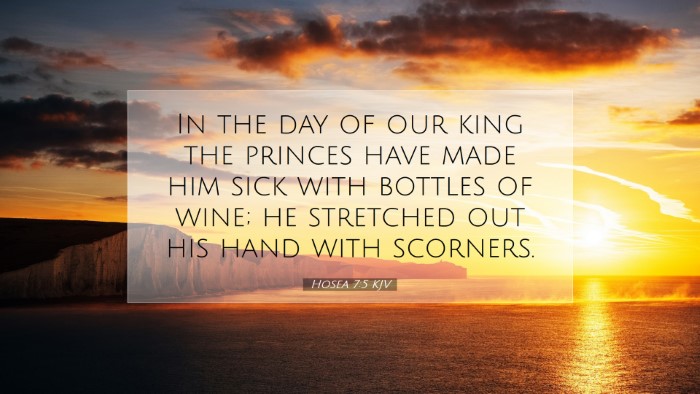Old Testament
Genesis Exodus Leviticus Numbers Deuteronomy Joshua Judges Ruth 1 Samuel 2 Samuel 1 Kings 2 Kings 1 Chronicles 2 Chronicles Ezra Nehemiah Esther Job Psalms Proverbs Ecclesiastes Song of Solomon Isaiah Jeremiah Lamentations Ezekiel Daniel Hosea Joel Amos Obadiah Jonah Micah Nahum Habakkuk Zephaniah Haggai Zechariah MalachiHosea 7:5
Hosea 7:5 KJV
In the day of our king the princes have made him sick with bottles of wine; he stretched out his hand with scorners.
Hosea 7:5 Bible Commentary
Commentary on Hosea 7:5
Verse Reference: Hosea 7:5 - "In the day of our king, the princes have made him sick with bottles of wine; he stretched out his hand with scorners."
Introduction
This verse provides a poignant insight into the spiritual and moral decline of Israel during the time of Hosea. It depicts the corrupting influence of leaders and the deep-seated issues within the monarchy and society at large. The metaphor of being made "sick with bottles of wine" illustrates the intoxication of both rulers and the nation, which leads to irresponsibility and rebellion against God.
Historical Context
The Book of Hosea is situated in the tumultuous period leading up to the fall of Israel. The kingdom was characterized by idolatry, immorality, and social injustice. This specific verse speaks to the failure of leadership during this time. According to Matthew Henry, the “king” symbolizes the institution of monarchy itself, which, rather than guiding the people towards righteousness, has succumbed to excess and oppression.
Commentary Insights
Matthew Henry's Observations
Matthew Henry notes that the “day of our king” refers not only to a specific moment in time but indicates a state of affairs where the leadership’s moral failing directly impacts the entire nation. Henry emphasizes that the use of wine as a metaphor for distraction and indulgence is intentional. Rather than governing with wisdom and integrity, princes are portrayed as revelers who engage in frivolity at the expense of their duties.
Albert Barnes' Analysis
Albert Barnes elaborates on the phrase “made him sick with bottles of wine,” indicating that the leadership’s indulgence leads to a kind of moral and spiritual affliction for the king himself and, by extension, the people. He points out that intoxication serves as a symbol of their commitment to pleasure over righteousness. Barnes insists that this lifestyle of the leaders exacerbates the spiritual sickness of the nation, highlighting a correlation between poor leadership and national decline.
Adam Clarke's Perspective
Adam Clarke provides a detailed linguistic analysis, suggesting that “stretching out his hand with scorners” indicates a yielding to those who mock righteousness. This reflects a broader failure of leadership to uphold the standards of justice and morality. Clarke points out that the leaders not only follow the ways of the wicked but align themselves openly with those who scoff at virtue, thus failing their sacred trust.
Theological Implications
This passage carries significant theological implications regarding leadership, accountability, and the effects of societal behavior on spiritual wellness. It illustrates the principle that leadership is inherently linked to the spiritual state of the community. The biblical interpretation here suggests that when leaders are corrupt, the people suffer; however, when they are righteous, they can lead the nation towards restoration and faithfulness to God.
Practical Applications
- Leadership Responsibility: Pastors and leaders are reminded of the weight of their influence on the community. The spiritual health of a community can reflect the integrity of its leaders.
- Discernment Against Indulgence: This verse calls for discernment against the intoxication of culture, ambition, and personal desire that distracts from godly living.
- Caution Against Compromise: It serves as a caution against aligning with those who mock righteousness, urging believers to maintain a stance of holiness.
Conclusion
Hosea 7:5 serves as a stark warning about the impact of compromised leadership and societal indulgence on spiritual integrity. This verse, reflecting a historical reality experienced by ancient Israel, continues to resonate today. As followers of Christ, recognizing the principles outlined in this scripture invites a deeper examination of our own leaders and the environments we create within our communities of faith. By heeding the warnings presented in this passage, we can strive towards a more righteous path in our personal and communal lives.


